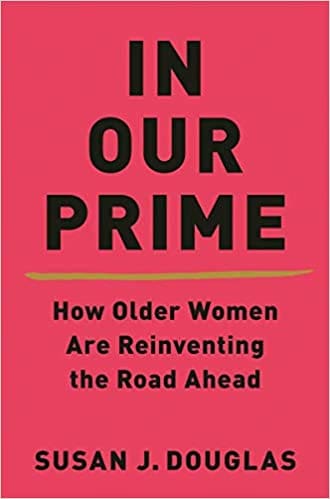
I like the idea of “In Our Prime” — that prime means aging and not youth.
Currently, I am watching a show on HULU called Mrs. America, which takes us to the era of the early 1970s when the ERA movement was active, strong, and fighting for equal rights for all women in America. Phyllis Schlafly is the nemesis who fights against the big names, like Gloria Steinem, who we all know fought for the ratification of the ERA across all states in America. It is an interesting look at the era and how women fought one another in a fight that seemingly should have united the sex rather than divide.
It is out of this context of thinking about this era and these great female leaders that I have picked up the book In Our Prime How Older Women are Reinventing the Road Ahead by Susan J. Douglas. The book focuses on women of the Baby Boomer generation and how they are perceived by society, politics, and media today. It has been close to 50 years since the fight to ratify equal rights for women played out. This book takes a look at where the movement is today for older women, i.e. post 50 years old.
As an aside, one thing that bothers me about this book is she groups everyone 50+ as a Baby Boomer. This is not accurate. It is about 56+ for women to be in this generation today. Perhaps this is because I am nearing the age of 50 and am proud to be a part of Generation X.
Douglas is looking at the perception of women from the different angles of society. American society has a “throw away” concept of older women, which is referred to as “gendered ageism” — that makes sense. It follows the old adage that men only get better with age like wine, unlike women. Douglas points to movies that perceive women in these ways. Old or older women really have no place.
The estrogen is dried up and gone, the woman’s baby factory is long since shut down — so now what is her use to society? I believe that this thinking hasn’t changed much even as the fearless women of the 70s fought to be seen as more than a choice to marry and have children. And, yet, as women age this is exactly the reason we are disregarded — the purpose of our sex is over. Men get better as they age especially if they can find a woman who is still alive with the potential for mating and reproduction.
This book argues for women to be seen equally in society as we age. Much like the women who fought in the 70s for women to have choice personally and professionally, now the fight is on for the older woman to be seen as one with dignity, purpose, and as an active, valuable part of society. The author provides some quick ideas for late age activists, like groups of women coming together to figure this out and then rallying around equity, particularly around healthcare.
It seems that we women will always have a fight on our hands with society and other women to try and establish a place in society that is fair and equitable throughout the lifespan. This book reminds us that the battle has never really been won, but is a continual one that needs attention, persistence, and activism throughout life.
It is worth a read — and there are a few more books that I want to highlight regarding aging woman, particularly one that focuses on elderly women and where we go when the end of life is near and the time is more for reflection and less about action. That time is also on its way.
